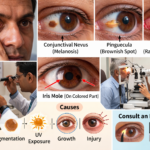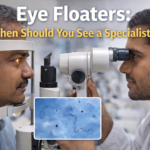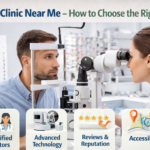As we age, our eyes—like the rest of our body—undergo natural changes. One of the most common and noticeable issues is presbyopia, a gradual loss of the eye’s ability to focus on nearby objects. If reading small print or working on your phone has become challenging, you’re not alone. This condition typically begins in your 40s and progresses with time.
At Axis Eye Clinic, under the expert care of Dr. Ramesh Murthy, patients receive advanced evaluation and customized solutions to restore visual clarity. Understanding presbyopia and exploring ways to correct it is the first step toward regaining visual comfort. If you’re searching for the Best Eye Clinic In Pune, this guide will help you make an informed choice.
You may notice yourself holding books or phones farther away to read clearly—one of the earliest signs of presbyopia. Unlike nearsightedness or farsightedness, presbyopia isn’t a disease but a normal part of aging.
Early recognition of these changes helps ensure timely management with the guidance of specialists like Dr. Ramesh Murthy at Axis Eye Clinic, where comprehensive diagnostic care ensures lasting results.
Common symptoms include:
• Difficulty reading small text or focusing on nearby objects
• Eye strain or headaches after close-up tasks
• The need to hold reading material at arm’s length
• Fatigue when using digital devices
If these symptoms sound familiar, it’s time to schedule an appointment at an Eye clinic near me for accurate diagnosis and early correction options.
These evaluations help identify whether presbyopia—or another refractive issue—is affecting your vision. Accurate diagnosis ensures you receive tailored recommendations, whether for glasses, contact lenses, or surgical options.
1. Eyeglasses:
The most common and convenient solution. Bifocal or progressive lenses allow clear vision for both near and distant objects.
2. Contact Lenses:
Multifocal or monovision lenses are great alternatives for those who prefer not to wear glasses.
3. Surgical Options:
Advanced procedures such as LASIK, conductive keratoplasty, or multifocal lens implants can offer long-term results.
Consulting the Best Eye Specialist in Pune at Axis Eye Clinic ensures that every treatment option is explained clearly so you can make an informed decision for your vision.
For those seeking convenience, multifocal contact lenses provide flexibility and natural vision at all distances. Each option has its advantages, and a consultation with Dr. Ramesh Murthy ensures your choice suits your daily routine and comfort.
When searching for a trusted Eye hospital in Kothrud, Axis Eye Clinic stands out for its personalized approach and high-quality optical solutions.
For patients undergoing cataract surgery, multifocal or accommodating intraocular lenses can be implanted to correct presbyopia effectively.
Every eye is unique—so discussing your options with Dr. Ramesh Murthy, known as the Best eye specialist near me, ensures you receive the safest and most effective treatment plan tailored to your condition.
• Eat a balanced diet rich in vitamins A, C, and E, as well as omega-3 fatty acids.
• Take regular screen breaks using the 20-20-20 rule—look at something 20 feet away for 20 seconds every 20 minutes.
• Use proper lighting when reading or working.
• Stay hydrated to keep your eyes naturally lubricated.
• Get regular checkups with professionals like Dr. Ramesh Murthy at Axis Eye Clinic for preventive eye care and early detection.
Under the expertise of Dr. Ramesh Murthy at Axis Eye Clinic, patients receive personalized care and cutting-edge solutions that restore confidence and clarity. Whether you need a quick vision assessment or long-term management, you’ll find trusted care at Pune’s most reputed clinic.
When searching for the Best Eye Clinic In Pune, remember that your eyes deserve only the finest care and technology. Schedule your appointment today at Axis Eye Clinic, and experience exceptional treatment guided by Pune’s leading vision expert.
At Axis Eye Clinic, under the expert care of Dr. Ramesh Murthy, patients receive advanced evaluation and customized solutions to restore visual clarity. Understanding presbyopia and exploring ways to correct it is the first step toward regaining visual comfort. If you’re searching for the Best Eye Clinic In Pune, this guide will help you make an informed choice.
What is Presbyopia?
Presbyopia is a natural age-related condition that affects the eye’s lens. Over time, the lens loses flexibility, making it difficult to focus on close-up objects. This stiffness prevents the eye from adjusting quickly between near and far distances.You may notice yourself holding books or phones farther away to read clearly—one of the earliest signs of presbyopia. Unlike nearsightedness or farsightedness, presbyopia isn’t a disease but a normal part of aging.
Early recognition of these changes helps ensure timely management with the guidance of specialists like Dr. Ramesh Murthy at Axis Eye Clinic, where comprehensive diagnostic care ensures lasting results.
Causes and Symptoms
The main cause of presbyopia is the gradual hardening of the lens within your eyes. As elasticity decreases, the ability to focus sharply at close range diminishes.Common symptoms include:
• Difficulty reading small text or focusing on nearby objects
• Eye strain or headaches after close-up tasks
• The need to hold reading material at arm’s length
• Fatigue when using digital devices
If these symptoms sound familiar, it’s time to schedule an appointment at an Eye clinic near me for accurate diagnosis and early correction options.
How Presbyopia is Diagnosed
Diagnosing presbyopia is simple and painless. During an eye examination, Dr. Ramesh Murthy at Axis Eye Clinic performs several tests, including visual acuity and refraction assessments, to determine how well your eyes focus at various distances.These evaluations help identify whether presbyopia—or another refractive issue—is affecting your vision. Accurate diagnosis ensures you receive tailored recommendations, whether for glasses, contact lenses, or surgical options.
Treatment Options
Several treatment methods can correct presbyopia, depending on lifestyle and personal preferences.1. Eyeglasses:
The most common and convenient solution. Bifocal or progressive lenses allow clear vision for both near and distant objects.
2. Contact Lenses:
Multifocal or monovision lenses are great alternatives for those who prefer not to wear glasses.
3. Surgical Options:
Advanced procedures such as LASIK, conductive keratoplasty, or multifocal lens implants can offer long-term results.
Consulting the Best Eye Specialist in Pune at Axis Eye Clinic ensures that every treatment option is explained clearly so you can make an informed decision for your vision.
Eyeglasses and Contact Lenses
Eyeglasses and contact lenses remain reliable solutions for managing presbyopia. Stylish frames and advanced lens technology make modern eyewear both fashionable and functional. Progressive lenses offer seamless vision correction without visible lines, while bifocals address specific focal points.For those seeking convenience, multifocal contact lenses provide flexibility and natural vision at all distances. Each option has its advantages, and a consultation with Dr. Ramesh Murthy ensures your choice suits your daily routine and comfort.
When searching for a trusted Eye hospital in Kothrud, Axis Eye Clinic stands out for its personalized approach and high-quality optical solutions.
Surgical Procedures
Surgical treatments offer a more permanent correction for presbyopia. Procedures like LASIK reshape the cornea to enhance near vision, while conductive keratoplasty (CK) uses radiofrequency energy to improve corneal curvature.For patients undergoing cataract surgery, multifocal or accommodating intraocular lenses can be implanted to correct presbyopia effectively.
Every eye is unique—so discussing your options with Dr. Ramesh Murthy, known as the Best eye specialist near me, ensures you receive the safest and most effective treatment plan tailored to your condition.
Lifestyle Changes and Preventative Measures
Maintaining healthy eyes involves more than just corrective treatments. Adopting simple lifestyle habits can help slow down the progression of presbyopia:• Eat a balanced diet rich in vitamins A, C, and E, as well as omega-3 fatty acids.
• Take regular screen breaks using the 20-20-20 rule—look at something 20 feet away for 20 seconds every 20 minutes.
• Use proper lighting when reading or working.
• Stay hydrated to keep your eyes naturally lubricated.
• Get regular checkups with professionals like Dr. Ramesh Murthy at Axis Eye Clinic for preventive eye care and early detection.
Conclusion
Presbyopia is a natural part of aging, but it doesn’t have to compromise your quality of life. With modern solutions—from glasses and contacts to advanced surgical treatments—you can regain clear, comfortable vision.Under the expertise of Dr. Ramesh Murthy at Axis Eye Clinic, patients receive personalized care and cutting-edge solutions that restore confidence and clarity. Whether you need a quick vision assessment or long-term management, you’ll find trusted care at Pune’s most reputed clinic.
When searching for the Best Eye Clinic In Pune, remember that your eyes deserve only the finest care and technology. Schedule your appointment today at Axis Eye Clinic, and experience exceptional treatment guided by Pune’s leading vision expert.






